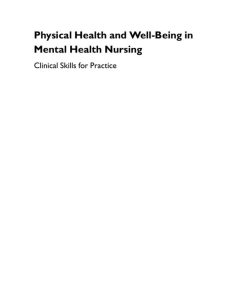Handbook of Mental Health Nursing 1st Edition by Stephen Tee, Joanne Brown, Diane Carpenter ISBN 9781040081686 1040081681
$50.00 Original price was: $50.00.$25.00Current price is: $25.00.
Authors:Brown, Joanne, Tee, Stephen, Carpenter, Diane , Author sort:Brown, Joanne, Tee, Stephen, Carpenter, Diane
Handbook of Mental Health Nursing 1st Edition by Stephen Tee, Joanne Brown, Diane Carpenter – Ebook PDF Instant Download/Delivery. 9781040081686 ,1040081681
Full download Handbook of Mental Health Nursing 1st Edition after payment

Product details:
ISBN 10: 1040081681
ISBN 13: 9781040081686
Author: Stephen Tee, Joanne Brown, Diane Carpenter
Handbook of Mental Health Nursing 1st Edition Table of contents:
Part 1 The Philosophy and Practice of Mental Health Care
Chapter One Introduction
Introduction to relational mental health nursing
Experiences of emotional distress and mental health nursing
Challenging practice
A humanitarian profession
Our responsibilities as professional practitioners
An interdisciplinary profession
How this book is organized
Part 1
Part 2
References
Chapter Two The therapeutic use of self
Introduction
Section 1: the art and evidence of reflective practice
Evidence-based practice
Reflective practice
Exercises in self-reflection and speaking and listening
Section 2: philosophies of care – Humanistic psychology and person-centred care
Phenomenology
Existentialism
Section 3: philosophies of care – psychodynamic counselling
Freud’s first model of the mind and therapeutic technique
Freud’s second model of mind and therapeutic technique
The ego and defence mechanisms
History repeats itself
Healer, heal thyself
Malan’s two triangles
Section 4: philosophies of care – cognitive behavioural therapy
Conclusion: fellow feeling and self-care
References
Chapter Three Values-based practice
What is values-based practice?
Self-awareness and personal values
Professional values
Introducing a model for values-based enquiry
A focus on the challenges and rewards of practice
Reflection on practice and service user involvement
Meet Iain: using the values-based model
Self-awareness
Recognizing professional values
Working with values of others
Reflecting on Iain’s care
Summary
References
Chapter Four Working in groups
Section 1: why bring people together to work in groups?
The history of group work
What constitutes a group?
Section 2: benefits of working in groups
Instillation of hope
Universality
Information giving
Altruism
Corrective recapitulation of the primary family
Improved social skills
Imitative behaviour
Inter-personal learning
Group cohesiveness
Catharsis
Existential factors
Section 3: setting up a group
Questions of administration
Questions around format
Questions for prospective members
Questions for you
Avoiding isolates
Section 4: group dynamics
Group dynamics start before the group
The conductor’s script
Early dynamics and its effects
Section 5: mid-group dynamics
Stopping drop-outs
Changes in leadership
Disclosure
Scapegoating
Managing conflict
Section 6: endings and leavings
Conclusion
References
Chapter Five Recovery: a journey of discovery
Introduction
What do we mean by ‘recovery’?
Family and friends face the challenge of recovery
The origin of ideas about recovery
What helps people in their recovery journey?
Recovery: not recovering from a past, but regaining a future
Recovery: conceptions and misconceptions
Not a theory of the origins of mental illness
Not about cure
Not a set formula
Not a professional intervention
Recovery: not ‘them’ and ‘us’
References
Part 2 The Policy and Organizational Context of Mental Health Care
Chapter Six Appraising and using evidence in mental health practice
Introduction
So why is being able to appraise and use evidence important?
Theoretical background
Delivering high standards of care based on best evidence
The value of clinical governance to support decisions
Using evidence
Evidence-based practice
Framing and reframing original questions arising from critical reflection on practice
Systematic searching, identification of criteria and selection of robust evidence
Inclusion and exclusion criteria
Choosing your databases
Identifying search terms
Critically appraising the evidence
Other issues to consider
Does the evidence answer your research question?
Implementing the evidence
Dissemination strategies
Reflective practice
Conclusions
References
Chapter Seven Developing nursing decision-making skills
Introduction
Decision-making theory
Putting theory into practice
Assessment
Decision-making
Conclusion: opportunity for reflection
References
Chapter Eight Leading and managing mental health care
Introduction
Leadership and nursing
Management and nursing
Are management and leadership exclusive functions?
Nurse management
Areas of responsibility in a nurse manager role
Mental health nurse management domains
Managing competing demands
Nurse leadership
A journey of competency development in nurse leadership and management
Summary
Further reading
References
Chapter Nine Promoting health and social inclusion
Introduction
Exclusion from society: a view from history
Approaches to treating mental illness
Introduction of moral treatment
Exclusion
Social inclusion
Promoting health and wellness
Preventing breakdown
Promoting breakthrough
Aiming to break out
Clinical and practice implications
Focus on wellbeing and restoration
Language and values
Conclusion
Accolade
Further reading and useful websites
References
Chapter Ten The what then, what now and what next of mental health nursing
Introduction
The ‘what then?’ of mental health nursing
The ‘what now?’ of mental health nursing
The ‘what next?’ of mental health nursing
Conclusion
References
Primary documentary sources
Index
People also search for Handbook of Mental Health Nursing 1st Edition:
oxford handbook of mental health nursing pdf
uon master of mental health nursing handbook
the handbook of community mental health nursing
psychiatric-mental health nursing pdf
You may also like…
eBook PDF
Psychiatric Mental Health Nursing 4th Edition by Sheila Videbeck ISBN 0781764254 9780781764254












